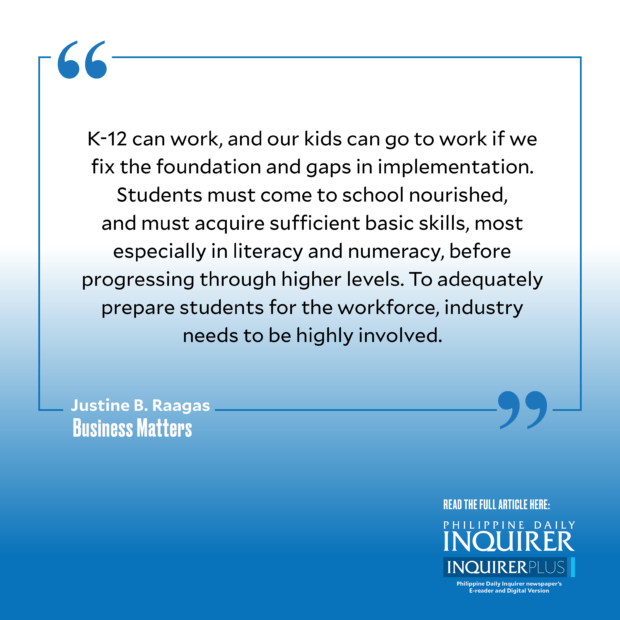What we don’t hear about K-12

A recent survey conducted by Social Weather Stations showed that about half of Filipinos are dissatisfied with the K-12 basic education program. Calls to repeal the program were mounting, saying it is an additional burden, with its promise of employability left unfulfilled.
Why is the promise of employability after K-12 elusive? Is it because 91 percent of our learners are still not able to read or understand a simple text at age 10? Could it be that our kids are going to school hungry and malnourished? Why do students spend 12 years in basic education and still exit with a learning outcome of a Grade 6 student? Are these issues a manifestation of problems in implementation, rather than in design?
The World Economic Forum, United Nations Educational, Scientific, and Cultural Organization, and the World Bank all emphasize the significance of 12 years of education for every child, highlighting its impact on economic growth and the achievement of Sustainable Development Goals.
Article continues after this advertisementLeading economies prioritize efficient basic education structures, demonstrating the advantages of a well-structured K-12 system. When effectively managed, K-12 has immense potential to drive economic growth.
In Switzerland, their K-12 system teaches the youth to become confident and decisive in their career path. Thanks to a framework that motivates students to pursue upper secondary education due to diverse educational pathways, opportunities for practical training, and recognition of qualifications, particularly in the vocational track. College education is free, but only 25 to 29 percent of students enroll because, for them, it is not the sole path to be educated and employed.
Switzerland’s education system stands out due to the strong collaboration between the public and private sectors. Ninety percent of upper secondary vocational students engage in combined school- and work-based programs, and remains a norm for most young people, fostering a smooth transition from education to the workforce.
Article continues after this advertisementThe Alpine nation has consistently ranked first in innovation economies, and if the Philippines is serious about achieving its AmBisyon Natin 2040 to become a prosperous middle-class society, it should look to countries like Switzerland and other high-income economies.
Another notable example is China, which ranks number 1 among the 36 upper middle-income group economies. China’s top performance in the Programme for International Student Assessment for reading, math, and science reflects its effective education system.
Like Switzerland, one of China’s strengths lies in having the world’s largest vocational education system. Their upper secondary education often involves fees, but the government has implemented measures to reduce financial barriers, such as subsidies. If SHS students in the Philippines are also granted subsidies to pursue vocational training and earn a national certification, it will significantly encourage their participation in training.
K-12 can work, and our kids can go to work if we fix the foundation and gaps in implementation. Students must come to school nourished, and must acquire sufficient basic skills, most especially in literacy and numeracy, before progressing through higher levels.
To adequately prepare students for the workforce, industry needs to be highly involved. There is an opportunity at present, with the ongoing review of the SHS curriculum, where the business sector can be involved.
It is also crucial to strengthen the immersion opportunity in SHS. In many of our programs in Philippine Business for Education (PBEd), we’ve seen a promising employability rate when the youth get firsthand exposure to employers. Private sector partners talk about the apparent difference of proper work immersion on graduates. This could only happen if we open our doors to them.
As we envision a thriving economy with a growing youth population, there is hope for the development of a system that enhances our youth’s ability to make choices that improve their lives. This system begins with the collaborative efforts of the government, industry, and academe, similar to the successful models in high-income countries. If all Filipino youth are determined on the pathway where they would advance personally and professionally, it is certain that the country’s economy as a whole will also benefit in turn.
—————-
Justine B. Raagas is executive director of PBEd. For questions or comments, email info@pbed.ph.
—————-
Business Matters is a project of the Makati Business Club (makatibusinessclub@mbc.com.ph).
















